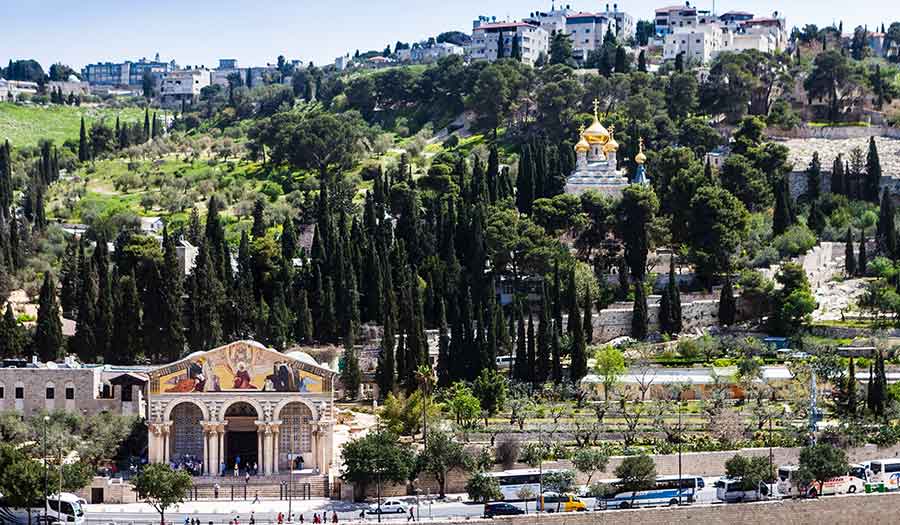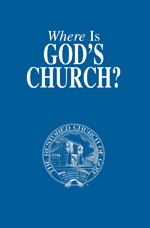 Getty Images
Getty Images
Article
What has Christ been doing the past 2,000 years up to our time? Here’s what the Bible says.
Learn the why behind the headlines.
Subscribe to the Real Truth for FREE news and analysis.
Subscribe NowMore than 2,000 years ago, Jesus Christ lived an extraordinary and controversial life, and was ultimately killed for the message He brought. And although most professing Christians would say they believe the record of His ministry, crucifixion and His resurrection, when many picture Christ they envision a dead Jesus.
Some believe He is coming again, and are awaiting His return. Among them are those expecting a secret rapture to occur, an event in which Christ will “sweep up” all true Christians to heaven just before calamity strikes the Earth.
But these beliefs and theories do not speak to where Jesus is today and what He is doing.
What has Jesus Christ been doing the past 2,000 years, up to our time now? Is He trying to help the poor through charity organizations or missionary campaigns? Is He constantly entering into people’s hearts when they give their lives to Him? Is Jesus spreading the kingdom of God on earth through evangelizing Christians? Is He working through all churches that profess Christianity, just a few, or only through individuals?
Although the subject is not often discussed, there need not be any mystery of where Christ is and what He is doing. You will soon have no doubt about His role. You are only required to believe the words of the Bible.
The Right Hand of God
Let’s begin by examining the gospel accounts of Christ’s life and death. A key prophecy describing where He went after His resurrection is found in Luke 22: “And as soon as it was day, the elders of the people and the chief priests and the scribes came together, and led Him into their council, saying, Are you the Christ? Tell us. And He said unto them, If I tell you, you will not believe: And if I also ask you, you will not answer Me, nor let Me go. Hereafter shall the Son of man sit on the right hand of the power of God” (vs. 66-69).
Christ’s words are clear. Before His death, He prophesied He would ascend to heaven. But did this happen? Can we find more evidence in the gospels?
After Jesus was raised from the dead, He continued to teach His disciples and prepare them for the work they would carry out after He was gone. The account in Mark records that after fulfilling His task, Christ ascended into heaven: “So then after the Lord had spoken unto them, He was received up into heaven, and sat on the right hand of God” (16:19).
Upon making the ultimate sacrifice, Christ was raised by God to the highest possible position on earth or in heaven. Notice: “When He [the Father] raised Him [Christ] from the dead, and set Him at His own right hand in the heavenly places, far above all principality, and power, and might, and dominion, and every name that is named, not only in this world, but also in that which is to come: and has put all things under His feet” (Eph. 1:20-22).
The Bible reveals that Christ “sat down on the right hand of the Majesty on high” (Heb. 1:3).
This picture is very different from what you may be accustomed to. After fulfilling His purpose on earth, Jesus Christ was glorified and exalted to sit at the Father’s right hand. Although we do not have space to explore every reference to Christ’s position at God’s right hand, it should be clear that Christ is alive and well. With all the talk of Jesus in Protestant churches, rarely does anyone speak of what Christ is doing at the right hand of God.
Now that it has been established where He is, what does Christ actually do?
A Living, Active High Priest
If Jesus has been in heaven during the past 2,000 years—through the fall of Rome, the bloody crusades, the Renaissance, World War I and II, and the advent of the Information Age—how does He spend His time?
The key to this question lies in one of the most important offices Christ holds. Among His many roles and titles, such as Prince of Peace, Savior, Apostle, King of kings, Lord of lords, Jesus Christ is also referred to as the High Priest.
Take note of this clear statement not only about Christ’s location, but also one of His offices: “Seeing then that we have a great High Priest, that is passed into the heavens, Jesus the Son of God, let us hold fast our profession. For we have not an High Priest which cannot be touched with the feeling of our infirmities; but was in all points tempted like as we are, yet without sin” (Heb. 4:14-15).
Let’s examine more proof of Christ’s all-important office. In Hebrews 3:1-2, Paul writes, “Consider the Apostle and High Priest of our profession, Christ Jesus; who was faithful to him that appointed Him.” The Bible makes clear that God the Father has appointed Jesus Christ to the office of spiritual High Priest. This is the office through which Christ works.
But what does Christ do as High Priest? The answer can be found by taking a more in-depth look at Hebrews.
Making Intercession
In Hebrews 8, Paul elaborates on Christ’s responsibilities as High Priest. “We have such an High Priest, who is set on the right hand of the throne of the Majesty in the heavens; a Minister of the sanctuary, and of the true tabernacle, which the Lord pitched, and not man. For every high priest is ordained to offer gifts and sacrifices” (vs. 1-3). Jesus Christ is described as a “Minister” in God’s sanctuary. He is working in God’s Temple, acting as a type of mediator between Christians and the Father. His sacrifice gives Christians access to God.
In Ephesians 2, Paul records, “But now in Christ Jesus you who sometimes were far off are made near by the blood of Christ…for through Him we both have access by one Spirit unto the Father” (vs. 13, 18). In order to break this wall of separation, Christ’s death was required. Through prayer, Christians are now permitted to enter the throne room of God (Heb. 4:16). It is only through Christ, as the active High Priest over His New Testament Church, that this is possible. It is His responsibility to present their spiritual sacrifices, their prayers, to God the Father.
The apostle Paul wrote, “Wherefore He [Christ] is able also to save them to the uttermost that come unto God by Him, seeing He ever lives to make intercession for them” (Heb. 7:25). Christ lives to intercede on a Christian’s behalf. The word intercede means to “intervene between parties with a view to reconciling differences.” In I Timothy 2:5, Christ is also called the “Mediator between God and men.” When fully understood, it is plain that Christ takes a crucial and active role in working with true Christians and the Father.
Guiding His Church
Another responsibility Christ has is to build, guide and protect the New Testament Church (Matt. 16:18). An earlier quoted verse from Ephesians reveals Christ’s role over the Church: “When He raised Him [Christ] from the dead, and set Him at His own right hand in the heavenly places…and has put all things under His feet, and gave Him to be the head over all things to the Church, which is His body, the fullness of Him that fills all in all” (1:20, 22-23).
Just as Jesus worked through His physical body during His earthly ministry, He now works through His spiritual Body—the Church (I Cor. 12:27). Christ is building His Church to fulfill God’s plan for humanity. The apostle Peter describes this process: “You also, as lively stones, are built up a spiritual house, an holy priesthood, to offer up spiritual sacrifices, acceptable to God by Jesus Christ” (I Pet. 2:5).
However, human beings cannot join the Church—God must call them into Christ’s Body. Notice: “No man can come to Me, except the Father which has sent Me draw him” (John 6:44; also see verse 65).
Christ places His ministers in the Body to teach, strengthen, counsel and edify its members (I Cor. 12:18-28).
Preparing and Refining a People
Christ has also been preparing Christians for positions in the soon-coming kingdom of God. Jesus told His disciples, “In My Father’s house are many mansions: if it were not so, I would have told you. I go to prepare a place for you” (John 14:2-4).
What did He mean by these statements? The term “mansions” means “rooms, abode or residence”—or offices. In ancient Israel, the Levitical priesthood served in various rooms in the temple of God; these rooms represented positions of authority. So “mansions” refers to authority.
Christ was speaking of His Second Coming, when He will establish the government of God on earth and give positions of rulership to His followers. God’s servants are being trained now to serve under Christ as kings and priests (Rev. 1:6; 5:10). Recall from I Peter 2:5 that the Church is called “a holy priesthood.”
Jesus Christ is training this advance team of leaders to rule under Him in God’s kingdom—a world-ruling supergovernment. But God will only trust leaders who have been properly trained and proven for such a task.
This leads to another aspect of what Christ has been doing for the past two millennia. Recall the phrase “perfecting of the saints” from Ephesians 4:12. From the start of the first-century Church, Jesus has also been helping the Father in the refining process of all Christians. Hebrews 10 states, “By the which will we are sanctified through the offering of the body of Jesus Christ once for all…after He had offered one sacrifice for sins forever, sat down on the right hand of God…For by one offering He has perfected for ever them that are sanctified” (vs. 10-12, 14).
The Greek word for “perfected” means “to complete, accomplish, consummate (in character), consecrate, finish, fulfill or to make perfect.” Coupling this with Jesus’ statement in Matthew 5:48, the process of becoming more like God—developing holy righteous character—to rule in His kingdom becomes clear.
The greatest work God is doing right now is perfecting His character in true Christians. Christ is described in Hebrews as the “Author and Finisher” of a Christian’s faith (12:2). Jesus Christ is, in a sense, helping to finish Christians.
“Confirming the Word”
By now you should have a much more comprehensive view on what Jesus Christ is doing. Although He is now in heaven, He will not remain there for much longer (I Thes. 4:16-17).
Before concluding, it is important to examine one final passage in Mark 16. “So then after the Lord had spoken unto them, He was received up into heaven, and sat on the right hand of God. And they went forth, and preached everywhere, the Lord working with them, and confirming the word [what they preached] with signs following” (vs. 19-20).
Verse 20 reveals that Jesus Christ worked with the first-century disciples from heaven. In Matthew 16:18, He promised His Church that “the gates of hell shall not prevail against it.” This means Jesus is actively working with His Church today—but where is it? For more information, read Where is God’s True Church?



